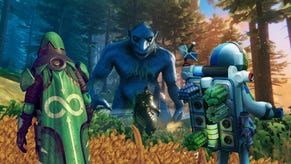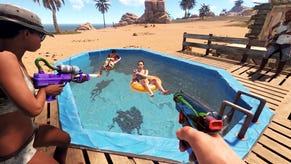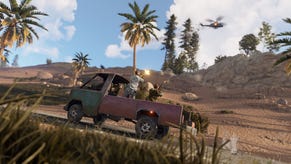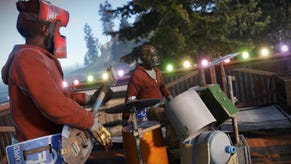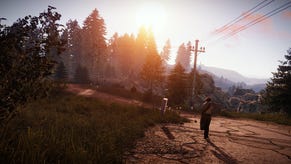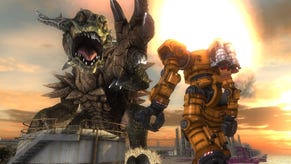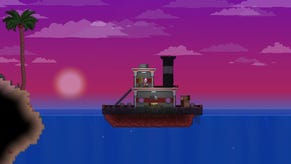Premature Evaluation: Rust
Rust is hell.
Every Monday, Rob Zacny gathers the raw materials of Early Access and attempts to survive against a world of crazed, screaming unfinished games. This week, he visits the ultra-popular survival game.
As I died screaming between a wolf's jaws, collapsing in the snow that dusts the top of the mountains while listening to it gnaw through virtual flesh, I had a realization: survival games are fun as long as they are about the threat of death.
Death itself is underwhelming: a gateway to an ever-increasing set of chores and tasks that you must repeat in order to recover your lost progress. Inevitably, the process eventually repeats, and the to-do list gets longer and less fulfilling, which sounds a little bit like hell and a little bit like a parable about the human condition. Rust [official site], the multiplayer survival game from Facepunch Studios, seems comfortable with both analogies.
If you're not familiar with Rust, or if you only know it as the Survival Game with Lots of Penises, it's actually a weirder and more interesting game than it first appears to be. You wake up in a strange landscape, cold and naked with nothing but a torch and a rock to your name. Then, after a few minutes of trial-and-error exploration of Rust's wilderness, you can start building crude tools out of loose materials, then using those tools to harvest more material to build better tools, etc. The tech tree runs from Stone Age materials all the way to automatic weapons and heavy body armor. Survival in Rust can become a fairly comfortable survivalist's fantasy if you stay alive long enough… but death comes swiftly and with little warning.
Rust is the closest I've ever come in a videogame to feeling like I was living in The Most Dangerous Game or The Ruum or any of those pursuit-and-survival classics that students read every year in middle school. Every player you meet is potentially a mortal threat or a potential ally, which is common enough for a survival multiplayer game, except that Rust also functions a bit like a social experiment. It's like someone gave Stanley Milgram a private island, a private army, and an endless supply of willing prisoners and said, "See what you can make happen here."
Every few hours in-game, a cargo plane flies overhead and makes a supply drop that draws players from all around the map into a highly charged, dangerous confrontation over the mere possibility of treasure. There might be nothing very special in those supply drops… but there might be advanced gear that would be difficult or impossible to craft yourself.
Alternately, an attack helicopter sometimes appears to hunt down and kill any players that it manages to see, and its appearance is as chilling as it is unexplained. It's existence is contrived, like everything else in Rust's deserted, semi-industrial wilderness, but still unsettling. It's something that forces me to consider what Rust looks like from above, as a bunch of half-naked, violent, and greedy people try and create peace and security for themselves in a setting of profound anarchy.
But eventually, you die. You didn't hide quickly enough and the helicopter mows you down in the open, or you were too busy stalking a deer to notice someone has been stalking you for the past few minutes and literally all you hear is a shot before the world turns red and you drop to the ground. Or you die in the dumbest of ways: taking a shortcut over a mountain, and a wolf walks up a near-vertical cliff face to surprise you at the exact moment that you don't have any of your good weapons equipped in the hotbar. A few impotent stabs with your spear later (a weapon with the worst hit-detection in the game) and you're back to square one: naked and alone.
Well, almost. Rust is also a game about securing property rights in an anarchic world, a John Locke essay with a flintlock blunderbuss and magical crafting items. When you die, you have the option to wake-up again at a sleeping bag you've left somewhere out in the world. Ideally, inside a home you've built next to a supply cache and behind a locked door. With a little foresight, you can leave an inheritance for yourself of decent tools, materials, and weapons so that you can get right back to your survival saga of living by your wits and slowly becoming predator rather than prey in this hostile world. If you build a tool cabinet inside, then nobody else can construct anything near your stuff, letting you securely lay claim to territory. After a couple deaths, I was building two of everything and jamming my hilltop fortress full of weapons and material.
But some loss of progress is inevitable, and if you get on a bad run, that little rainy-day fund will get depleted and eventually you're back to being alone with a rock and virtual genitalia (which will, of course, be the name of my forthcoming memoir). At that point, Rust becomes a far less joyous and evocative experience and something a lot more like shift-work. The first time you hunt a half-dozen animals and smelt enough metal ore to create advanced weapons and armor you feel like Ash in Army of Darkness. The fourth time you do it, and you're chopping down yet another tree with a stone hatchet, or chasing a deer around some rocks? It starts to feel like survival might be a punishment rather than a goal.
The weird thing is, I think that's contributed to a strange sense of community on some servers. A year or so ago, Rust sounded like a game full of half-naked sociopaths killing each other in front of a pig's skull. Now, while there's still a heavy air of distrust that hangs over the proceedings, there's also more respect and cooperation. Neighbors ask to borrow tools to get back on their feet. Warnings go out regarding particularly violent players who are causing trouble. It's not that Rust is turning into some kind of utopian experiment, but it's definitely less the anarchy that it was in the past. Live, and let live seems to be the rule in Rust, unless someone has REALLY nice stuff and you have a clear shot.
There is an irony to success in Rust: the better you are at surviving, the less that will actually happen. Just before writing this, I spent a couple hours upgrading my building, building new weapons and ammunition, and collecting extra supplies to keep behind a new electronic lock. I have windows that afford me a view in every direction, and a kind of parapet on the third floor from which I can shoot down at anyone who starts trying to batter down my walls. I spend most of my time hiding from other players now, or hiding from the helicopter, or watching out for bears and wolves. When I think about a typical session of Rust, it's a catalog of things that didn't happen, of risks successfully avoided and bets wisely hedged. The brilliance of Rust is that it demands a lot of suspenseful work, attention, and planning to make sure that it remains uneventful.
Rust is available on Steam for £14.99 / $19.99. My impressions are based on build 1008380 on 7 March 2016.








